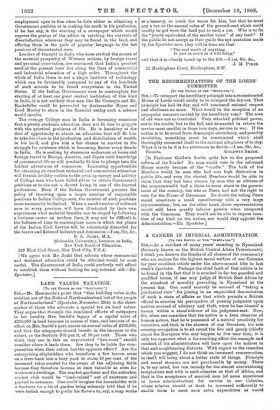EDUCATION AND UNREST IN INDIA-
rTo THR EntToR Or THE "SPECFATOR.1 Sin,—There is a great deal of force in the statements made by Mr. H. C. Irwin in his letter entitled "Sedition in India" (Spectator, November 7th) that "a post in a Government office" is the goal of the average student in school and College, that the candidates outnumber the vacancies, and that disappointment in obtaining a position leads to embitter- ment against a Government which "has made him the hope- less failure he is." To remedy this evil, Mr. Irwin suggests the starting of Training Colleges at provincial capitals as the only channels of admission into the subordinate Service.
While Mr. Irwin's diagnosis of the unrest among school and College men in India is.partially correct, the remedy may solve the problem only in the cases of those who bare neither the means nor the desire to go to a College, and who would look upon a subordinate position in Government service, carrying a salary of leas than fifty rupees per month, as their chief aim in life. It must be remembered that it is not in this class, but in the more important class of men who have gone through the grind of higher examina- tions and have secured one or two University degrees, that the real causes of India's unrest must be sought. They are the product of a system of education which has encouraged them to look upon Government service as the sole prize of academic attainment. The majority of those who enter the legal and medical professions gravitate towards large cities like Bombay and Calcutta, where the professional fields are already overcrowded and competition is very keen. Many get stranded in middle life, and discover too late that they are misfits in their chosen profession, and that if they had been properly guided early in their College career the choice of a profession would have been made with greater conformity to the natural bent of the mind. The average College man in India who turns his hand to commerce generally cuts a sorry figure for want of a commercial education and capital. The only avenue for employment open to him when be fails either in obtaining a Government position or in making his mark in his profession, if be has any, is the starting of a newspaper which would express the genius of the editor in catching the currents of dissatisfaction wherever they may be found in the land, and offering them in the garb of popular language to the .hot passions of discontented men.
Leaders of thought in India who have studied the causes of the material prosperity of Western nations, by foreign travel and personal observation, are convinced that India's greatest need at the present hour lies along the lines of commercial and industrial education of a high order. Throughout the whole of India there is not a single institute of technology which can be favourably compared to any of the hundreds of such schools to be found everywhere in the United States. If the Indian Government were to contemplate the starting of at least one great central institution of this kind in India, it is not unlikely that men like Mr. Carnegie and Mr. Rockefeller could be persuaded by Ambassador Bryce and Lord Morley to share in the financial outlay such a scheme would involve.
The average College man in India is becoming conscious that a purely academic education does not fit him to grapple with, the practical problems of life. He is knocking at the door of opportunity to obtain an education that will fit him to take his place in the production and distribution of wealth in his Lad, and give him a fair chance to survive in the struggle for existence which is becoming fiercer every decade in India. He is seeking by strenuous endeavour at home and foreign travel in Europe, America, and Japan such knowledge of commercial life as will gradually fit him to plunge into the boldest adventures of commerce. Increasing opportunities for obtaining an excellent technical and commercial education will furnish healthy outlets to the pent-up energy and activity ef College men who have failed either to obtain Government positions or to eke out a decent living in one of the learned professions. Even if the Indian Government pursues the policy of throwing open a larger number of responsible positions to Indian College men, the number of such positions must necessarily be limited. When a small number of cultured men in every province will have illustrated by their own experiences what material benefits can be reaped by following a business career on modern lines, it may not be difficult in the fullness of time to contemplate cases in which the plums of the Indian Civil Service will be voluntarily discarded for the loaves and fishes of industry and Commerce.—I am, Sir, &c., S. L. JosHr, M.A.
• (Columbia University), Lecturer on India, New York Board of Education.
215 West 23rd Street, New York City, U.S.A.
[We agree with Mr. Joshi that schools where commercial
and technical education could be obtained would be most useful. The Government of India could perfectly well afford to establish them without looking for any external aid.—ED. Spectator.]















































 Previous page
Previous page